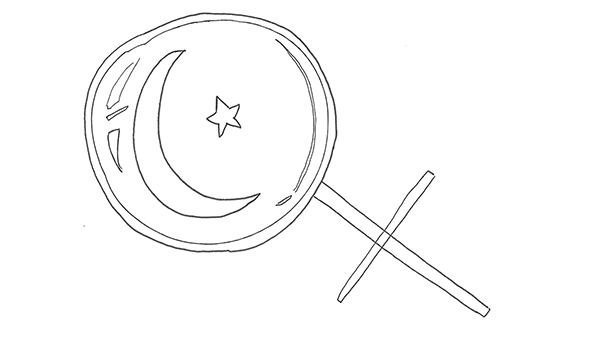Looking for feminism in Muslim communities
December 1, 2014
This article comes from the Global Desk, a collaboration between The Gazelle, WSN and On Century Avenue. Read more by searching ‘global.’ This is a personal essay.
Prior to university, my faith community experience at home was emotionless, homogeneous and somewhat primitive. I never felt accepted in my community because I never met the desired standard placed by older women who are separated from me by a cultural and generational gap. I am loud, outspoken, proudly plus-size and, just like the sons in my community, was raised expecting to single-handedly take over the family business. I rejected the ideals of elder women who believed that if a girl is not studying to be a doctor, she should have been taught how to cook, clean and reproduce. And even if she is a doctor, learning how to make chai and serve it on a platter with a doily to your in-laws is a necessary skill.
When I came to the Islamic Center at NYU, I experienced a radically different change in environment. I was initially on a religious high, but it was not long before I got swept away with the communal experience and leadership opportunities that I forgot I came here to build my individual spirituality.
The IC is undoubtedly one of the most progressive liberal faith communities that I have experienced. At the IC, women have the chance to be leaders, community builders, social beings, academic mavens and pillars of faith and spiritual dialogue. It is up to us to question our comfort zones and barriers in order to discover whether such a community is a game of pick-and-keep or sacrifice. I learned how to cry in a co-ed circle, open up to others and myself and experienced what community feels like for the first time. I was plagued with anger and wondered why other Muslim communities aren’t creating such engaging environments.
It took a few semesters for me to realize why, but I can understand why some conservative communities do not progress — it is out of fear of liberalism. Perhaps it is not neceissarily the fear of feminism progressing that scares conservative Muslims. Perhaps, it’s the replacement of individual spirituality for a communal experience that frightens them. I cannot be sure if it is one or all of the above but, having experienced liberalism and progressive feminism in my undergraduate Muslim community, I can verify their fear is based on an inevitable reality, but that does not mean the tradeoff is worthless.
Yes, there were times when I fell spiritually, but it was before I learned to get up and stand taller. The leadership opportunities at the IC were so attractive that I placed them above growing in my individual spirituality. I find it ironic that, though I came to my undergraduate faith community for religion, it empowered me in ways I did not expect it to.
There is no doubt that it is amazing to be a part of a community that is willing to let you improve them.
I have experienced my spirituality — much like any other person of faith — as a roller coaster ride with steep slumps and high peaks. Now that I have made it past some of the slumps, I have taken measures to help myself gain individualism in my faith. I co-founded a Muslim-Christian Dialogue club at NYU with a dear friend of mine from the Christian community. Many students from both communities get together each week and discuss our passages, raise questions, clear up confusions and challenge each other respectfully. Learning about other faiths, asking questions without consequence and hearing the stories of my community are ways for me to grow in my own faith.
I would repeat my experience a million times over, because regardless of the path I chose, I learned that it is not up to any community to ensure that each individual forms a spiritual relationship with God. The sole job of a community is to provide opportunities to nourish spirituality — it is us who must learn to spiritually capitalize on them.
Muslim women at NYU have shaped the community and can continue to take opportunities to create dialogue that addresses both their spiritual and non-spiritual needs. The Chaplain for the Islamic Center at NYU, Imam Khalid Latif, asked me, “If you don’t know about Islam, how can you be empowered by it?” To answer his question, you can’t. Therefore, the Muslim community at NYU will always be a place that is moving forward and continuously improving. If other communities adopt this mindset, they too can begin to progress into the future of spirituality, whether it is in the realms of feminism or individualism.
Email Fatima Sheikh at [email protected].



























































































































































